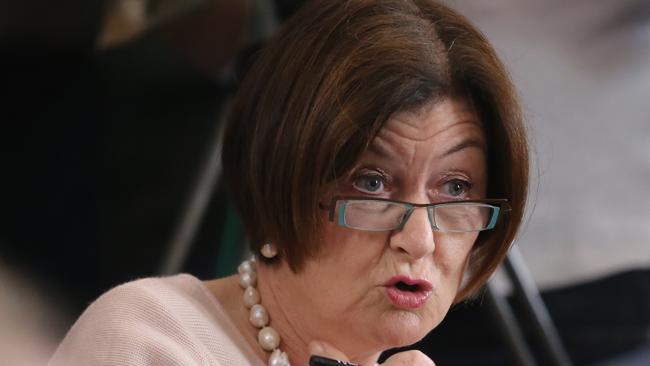Kate McClymont advocates a change in defamation laws
Investigative reporter Kate McClymont has won five Walkley awards and collected even more death threats | PODCAST

Investigative reporter Kate McClymont, who has won five Walkley awards and collected even more death threats, is a firm advocate for changing defamation laws..
The Sydney Morning Herald investigative reporter has the distinction of being successfully sued by former NSW politician Eddie Obeid, a man now in jail due to her reporting.
McClymont doesn’t shy away from criticising judges. “I sometimes wonder whether judges really understand the nature of our profession and what a daily deadline means. It sometimes just doesn’t appear to be a realistic understanding and perfection seems to be a very high bar that is often required.”
McClymont is a conundrum. She tends to package up the threats into amusing anecdotes, but later reveals her extraordinary longevity at the Herald is partly due to her being “too scared” to move to another newspaper.
Her stories are legion: not the ones she puts into the paper but the stories about herself.
But getting insights into her drive and motivation — why she does what she does — prove beyond the investigative capabilities of this writer.
Anecdotes abound. She admits to The Australian’s Behind the Media podcast that she was preparing to give birth to her second child when she phoned the Herald news desk to file a story from the labour ward. Has that child become a journalist? “Oh no, that child has become a lawyer,” says McClymont, which is loaded with significance, considering how many times she has locked horns with them in defamation actions.
Gossips make great journalists, McClymont declares. “I just don’t like to call it gossip, I’d like to call it an exchange of colourful information, which is what journalism is about.”
The journalist, who has spent almost her entire career at The Sydney Morning Herald bar a two-year stint as a Four Corners researcher, is well known for talking to anyone, any time. “If people bother to either ring you or contact you or email you, you owe those people a duty to say yes or no. I can’t bear it when I contact people and they don’t get back to me.”
A “deafening silence” is just “downright rude”, even though she admits the useful information gleaned from such encounters is “about 5 per cent”.
But contact with broadcaster Tracey Spicer bore fruit. The Fairfax-ABC joint investigation into allegations of harassment against former television star Don Burke, which he denied, created waves across the media and shredded his reputation. But while all parties were all together at the mid-year Walkley awards last week, there is seemingly friction, with Spicer criticising Fairfax Media in The Saturday Paper for powering down on its investigation. McClymont denies the investigation is dead but is not working with Spicer. “I’m working on one at the moment, but it’s one of those things that it’s easier said than done.”
The investigations are hard because of the “big gap” between journalistic requirements and legal standards of proof. “Whenever I do a story, in the back of my mind is a lawsuit,’’ McClymont said. “Often you don’t do a story if your key person says, ‘I will never go in a witness box’. Then you have to balance whether if push comes to shove you’re going to go down in a screaming heap if you’ve got no one to come forward. It’s immensely frustrating, and it’s gruelling for you and your sources to actually go through a defamation action. It’s soul-destroying.”
So far Burke has not taken legal action. But Craig McLachlan is suing the ABC, Fairfax Media and one of the women who made accusations against him in stories on which McClymont worked.
McClymont received her first death threat after covering a wedding — albeit a family wedding of Sydney eastern suburbs crime boss George Freeman.
After her first job as a Herald cadet writing about cushions and pillows, McClymont was appointed gossip writer at Herald weekly suburban supplement the Eastern Herald. The column was called Chums. The bridesmaids, she wrote, all wore sequined dresses because that was the closest fashion accessory you could get to armour plating.
“So before I knew it I was getting death threats from George Freeman. And I just thought, maybe I should give up on this social caper, but I just thought what really interested me was that somebody would take umbrage at something so minor. So I don’t know whether that’s what piqued my interest.
“But I did laugh years down the track. I had reported George Freeman’s son being the pillow bearer with the ring on it. Fast forward 25 years and the same son is in jail for drug manufacturing.”
Other threats were more serious, less anecdote-worthy, and delivered to her letterbox. On one occasion her young family moved house, on another she was given a bodyguard. “I guess it was full-on at the time, but in the back of my mind I always say to myself: ‘They want you to stop reporting, I don’t think that they actually want you dead.
“The threats are to stop you doing what you’re doing and I see it as a form of bullying, and I just don’t think you can ever give in to that. Look, I absolutely love my job and you know most days I just can’t believe how lucky I am to have found such a fascinating and rewarding career. It’s occasionally stressful and tiring.”
Her drive and industriousness remains a mystery. “I don’t even know myself. I really don’t know. I can’t really say why I ended up doing this..”



To join the conversation, please log in. Don't have an account? Register
Join the conversation, you are commenting as Logout